Ever sat in a quiet room and felt like your brain was screaming for distraction? Yeah, that uneasy itch where silence feels more like a threat than a breather. It’s weird how something as simple as quiet can make us fidgety or anxious, right?
Introduction
This article dives into why silence often feels so darn uncomfortable these days think digital overload, hidden traumas, or even brain wiring gone haywire. We’ll unpack the roots, spot the signs, and share real ways to make peace with the quiet, without forcing it. Along the way, you’ll get a self-checklist to see if this rings true for you, plus some brain science to back it up. For more on tuning out the noise, check out our piece on digital detox tips that actually stick. And if you’re curious about the psych side, here’s a solid read from Psychology Today on silence and mental health. Oh, and stick around for our quick online quiz to gauge your silence tolerance it’s eye-opening.
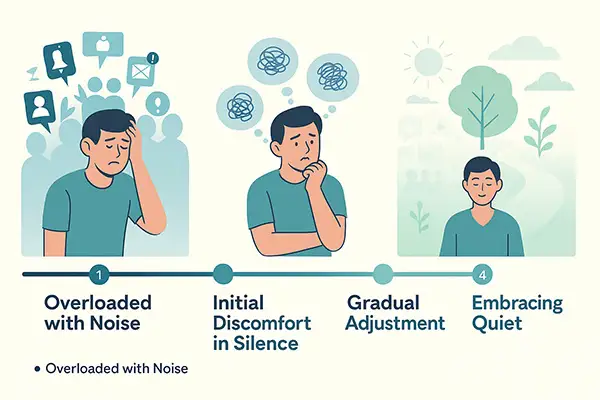
Why Silence Feels Like a Stranger in Our Noisy World
Man, remember when quiet was just… normal? Like chilling in a park without your phone buzzing every five seconds or needing music to fill the void. These days, silence hits different it’s like an uninvited guest that makes you squirm. We’re so wired to constant input from social media, podcasts, work pings, that hitting pause feels off.
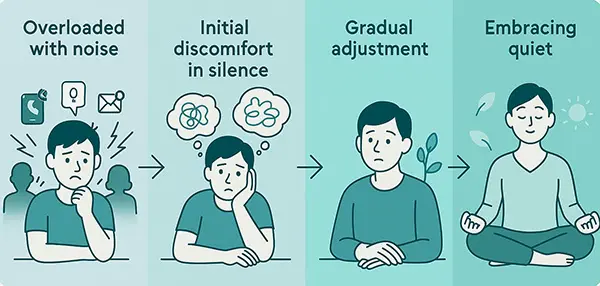
But here’s the thing: that discomfort isn’t just you being weird; it’s a sign your brain’s adapted to chaos. And relearning quiet? It can unlock some serious inner peace, like finally exhaling after holding your breath too long. I mean, think about it how often do we let our minds just be without judging the empty space?
Personal Story: When Turning Off the Noise Made Me Feel Worse
Okay, confession time. A few months back, I tried this whole “digital detox” thing during a weekend getaway. No phone, no TV, just me and the woods. Sounds blissful, right? Nope. By hour two, I was pacing like a caged animal, my thoughts racing about every unfinished task, old regrets, even dumb stuff like “did I lock the door back home?” It felt worse than the noise I was escaping heart pounding, mind spinning.

Turns out, I’d gotten so used to distractions that silence brought up all the stuff I’d been avoiding. Kinda like peeling off a band-aid too fast. But sticking with it? By day two, things shifted. The quiet started feeling less scary, more like a friend. If you’ve been there, know it’s normal and fixable.
What Is Uncomfortable Silence and Why Does It Matter?
Defining Silent Anxiety and Its Digital Roots
Silent anxiety yeah, that’s what I call that prickly feeling when everything’s too quiet and your insides start buzzing. It’s not full-blown panic, but more like a low hum of unease that makes you wanna grab your phone or turn on some background noise. Why does it matter? ‘Cause ignoring it means missing out on real rest. Our digital world feeds it endless scrolls, notifications training us to fear the quiet like it’s boredom’s evil twin. But silence isn’t empty; it’s space for your brain to process, heal, recharge. Without it, we stay stuck in shallow mode, never diving deep into what we really feel. Ever notice how after a noisy day, quiet feels almost loud with your own thoughts? That’s the root digital habits turning silence into a stranger.
Silent anxiety sneaks up when quiet hits, but recognizing it is your first step to reclaiming calm most folks feel it from too much screen time
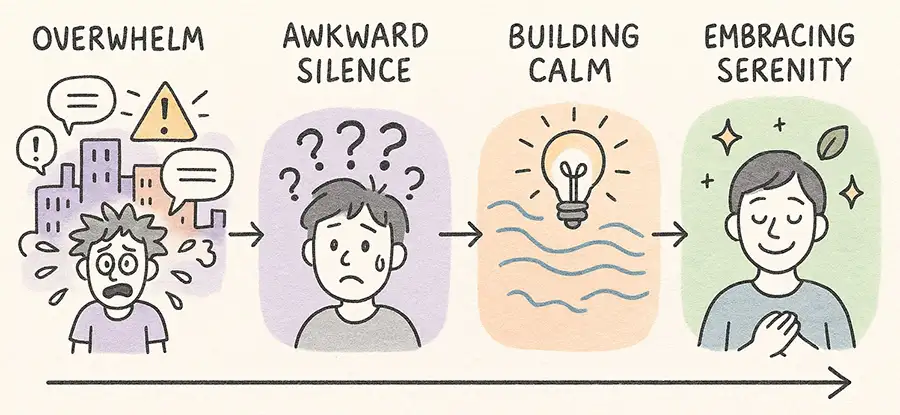
How Constant Stimulation Rewires Your Brain
Here’s where it gets sciency, but stick with me. Constant stimulation from apps, music, chatter literally changes your brain’s wiring. Neuroplasticity, they call it; your noggin adapts to crave more input, making quiet feel like deprivation. I read this study where folks hooked on social media showed brain patterns similar to addiction dopamine hits from every like or ping. Over time, silence triggers withdrawal-like symptoms: restlessness, racing thoughts. But the cool part? You can rewire back. Start small, like sitting quiet for two minutes a day, and your brain learns to chill again. It’s like training a muscle hurts at first, but gets stronger. For deeper dives, check Verywell Mind’s take on brain rewiring. Oh, and if you’re into self-growth, our post on mindful living basics ties right in.
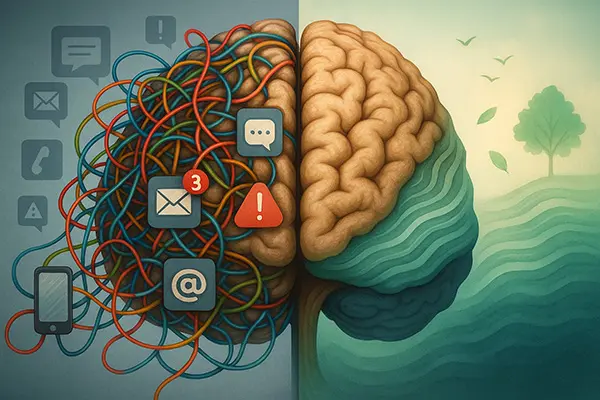
Signs You’re Uncomfortable in Silence
Common Symptoms of Quiet-Induced Unease
Spotting the signs? It’s sneaky. Maybe you fidget endlessly when alone, or feel this vague tension creep in during quiet moments like waiting in line without your phone. Common stuff: heart rate picks up a bit, shallow breaths, or that urge to fill the air with anything. For me, it’s always reaching for snacks or humming tunelessly. These aren’t big red flags, but they add up, stealing your peace bit by bit. And in our always-on world, it’s easy to miss ’em. But hey, noticing is half the battle means you’re ready to shift. 😌
Why Your Mind Races When Things Get Quiet
Ever wonder why quiet turns your brain into a racetrack? It’s like all the suppressed stuff bubbles up worries, to-dos, random memories. Psych folks say it’s ’cause noise distracts us from inner chatter; remove it, and boom, floodgates open. From an evolutionary view, quiet might signal danger (think caveman times), so your brain revs up to stay alert. Add modern stress, and it’s amplified. But get this: racing minds often hide deeper needs, like unresolved emotions or burnout. One time, during a power outage, my thoughts went wild about old family stuff I hadn’t processed it. Quiet forces confrontation, which feels icky but heals if you let it.
Checklist of subtle signs (e.g., fidgeting, reaching for phone) with yes/no columns for self-assessment.
| Subtle Sign | Yes/No |
|---|---|
| Fidgeting or tapping feet in quiet rooms | |
| Immediately reaching for your phone when alone | |
| Feeling restless during pauses in conversation | |
| Turning on music/TV as background noise always | |
| Heart racing or shallow breathing in silence | |
| Mind jumping to worries when things get quiet | |
| Avoiding solo activities like walks without pods | |
| Feeling bored or anxious without stimulation |
Reasons and Roots Behind Hating Silence
The Role of Digital Overstimulation
Digital overstimulation? Guilty as charged. We’re bombarded pings, feeds, videos training our brains for constant hits. Silence then feels like a void, empty and unnerving. Studies show heavy screen time reduces attention span, making quiet intolerable. I cut back on apps last month, and wow, the difference quiet went from enemy to okay-ish. It’s not just habit; it’s how dopamine loops keep us hooked, fearing the “nothing.” But breaking it? Start with phone-free zones. Our guide on digital wellness habits has more deets. Try a 10-min no-screen break daily; it eases that hate for silence gently.
Is Hating Silence a Symptom of ADHD or Other Conditions?
Hating silence? Could tie to ADHD folks with it often crave stimulation to focus, quiet amps up inner chaos. Not just ADHD; anxiety disorders, too, where silence lets worries roar. I know someone with ADHD who blasts music to “think straight” makes sense, brain seeking balance. But it’s not always a “condition”; sometimes just learned behavior. If it disrupts life, chat with a pro. APA’s info on ADHD symptoms is helpful. And for growth angles, link to our self-awareness tools.
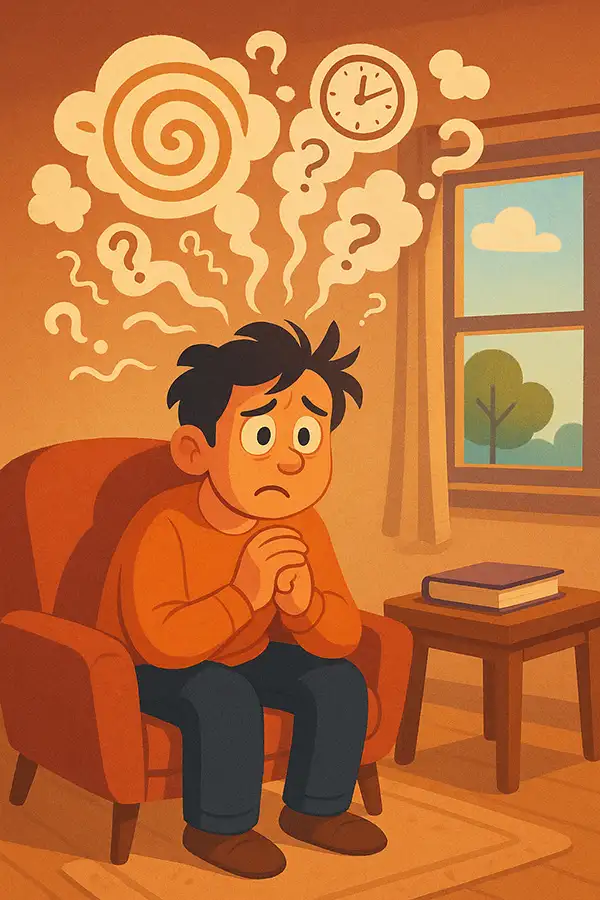
Psychological Factors: From Trauma to Habitual Distraction
Dig deeper, and psychology points to roots like trauma silence might echo past isolation or unsafe quiet moments, triggering unease. Or habitual distraction: we avoid quiet ’cause it surfaces pain, regrets, the heavy stuff. Like, after a breakup, I drowned in noise to skip the hurt. Cultural factors play in, too busy societies prize productivity over pause. Even gender wise, some studies say women feel more pressure to fill silences socially. From a neuro lens, hormones like cortisol spike in quiet if you’re stressed, making it feel threatening. But viewing it evolutionarily?
Quiet was survival time now it’s luxury we forgot. One para on science: Neuroscience shows trauma alters amygdala, heightening quiet’s “danger” signal; psychology links it to avoidance coping; hormones? Adrenaline dips in silence, but if baseline high, it feels off. Real example: My aunt, post-loss, hated quiet ’til therapy unpacked grief. For LGBT+ folks, silence might amplify identity struggles or past rejection fears finding safe quiet spaces, like affirming meditation groups, helps reclaim it without added weight. 😊
Comparing Uncomfortable Silence to Similar Issues
Silence vs. Overthinking: Key Differences
Okay, so silence and overthinking they’re like cousins, right? Both can make your head feel like a pinball machine. But here’s the scoop: overthinking hits anytime, like replaying that awkward convo from last week while trying to sleep. Silence discomfort? It’s tied straight to the quiet itself, that moment when noise stops and your brain goes “uh oh, time to freak.” I remember lying in bed, lights off, and bam thoughts about tomorrow’s meeting spiraling. That’s overthinking. But in a quiet car ride? It’s more the emptiness bugging you, not just the thoughts. From a psych angle, overthinking often stems from rumination, a habit where you chew on problems endlessly. Silence unease is more avoidance your mind races ’cause it’s not used to downtime. Wanna know a key diff? Overthinking drains you mentally all day; silence stuff only flares in quiet spots. And yeah, for some in the LGBT+ community, overthinking might layer on with identity stress, like second-guessing how you show up in social scenes, making silence feel even heavier if it brings up those doubts.
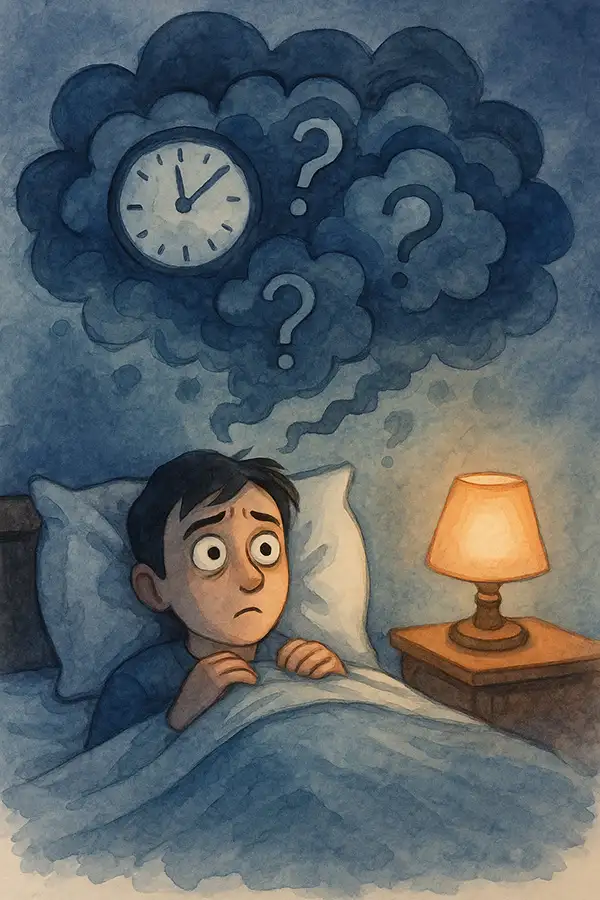
Silence Discomfort vs. General Anxiety
Now, general anxiety? That’s the big umbrella heart racing over nothing, constant worry vibe. Silence discomfort is more like a specific flavor of it, kicking in when things get too still. Think: you’re fine in a buzzing cafe, but alone in your room? Unease creeps. General anxiety might buzz all day, triggered by crowds or deadlines. But silence thing? It’s that void amplifying inner noise. A buddy of mine with anxiety said quiet walks helped her, but for me, it first made stuff worse like old worries surfacing. Psych-wise, general anxiety links to GABA imbalances, brain chemicals out of whack making everything feel threatening. Silence discomfort? Often habitual, from digital habits, not always a full disorder. Try this: if anxiety meds help overall but quiet still bugs you, it’s likely the silence part needing separate work. Oh, and evolutionarily? Our ancestors thrived on alert in quiet predators lurking so hating silence might be wired in, but modern life amps it up with constant stim.
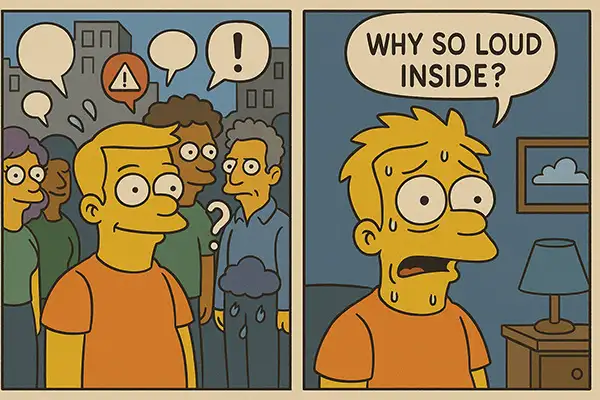
| Aspect | Uncomfortable Silence | Overthinking at Night | General Anxiety |
|---|---|---|---|
| Triggers | Sudden quiet moments, like alone time or power outages | Bedtime wind-down, replaying daily events | Anything work, social stuff, even good changes |
| Symptoms | Fidgeting, urge to fill noise, mind racing specifically in stillness | Endless loops of “what ifs,” insomnia, physical tension | Constant worry, rapid heart, sweating anytime |
| Quick Fixes | Short grounding breaths, timed quiet exposure | Journal dump before bed, herbal tea ritual | Therapy tools like CBT, meds if needed check our post on why can’t I turn my brain off for night-specific tips |
For more on that night overthinking grind, hit up Verywell Mind’s anxiety vs. overthinking breakdown. 😅
Stages of Relearning Silence
From Avoidance to Acceptance
Shifting from dodging quiet to actually liking it? It’s a journey, not a switch flip. Starts with avoidance you blast music or scroll endlessly to skip the unease. Then, bam, you hit discomfort when forced into silence, like during a blackout, and thoughts flood. Practice phase? That’s where you dip toes in, maybe five minutes no noise, building up. Finally, acceptance: quiet feels neutral, even nice, like a cozy blanket for your brain. I went through this after ditching my commute podcasts first week sucked, mind all over, but by month end? Quiet car rides were my think time. Neuro side: it rewires neural paths, dopamine from noise fades, replaced by calm serotonin boosts. Key? Patience rushing acceptance just adds stress. And culturally? In busy Western spots, we avoid quiet like plague, but Eastern practices like meditation make it sacred.
Building Tolerance Step by Step
Build it slow, folks. Step one: notice when you avoid track it in a note app. Two: start tiny, like one-minute sits with no input, eyes closed. Three: add sensory anchors, soft light or comfy spot to make quiet safer. Four: reflect post-session what came up? Journal it. I built mine during lunch breaks no phone, just eating slow. At first, fidgety mess, but soon? Thoughts settled. For ADHD peeps, pair with fidget toys to ease in. Hormonally, cortisol drops as you practice, turning fight-or-flight quiet response into rest mode. One study from neuroscience showed consistent quiet exposure thickens prefrontal cortex, better emotion control. If trauma’s in mix, therapist-guided steps help don’t solo if it’s heavy 😌
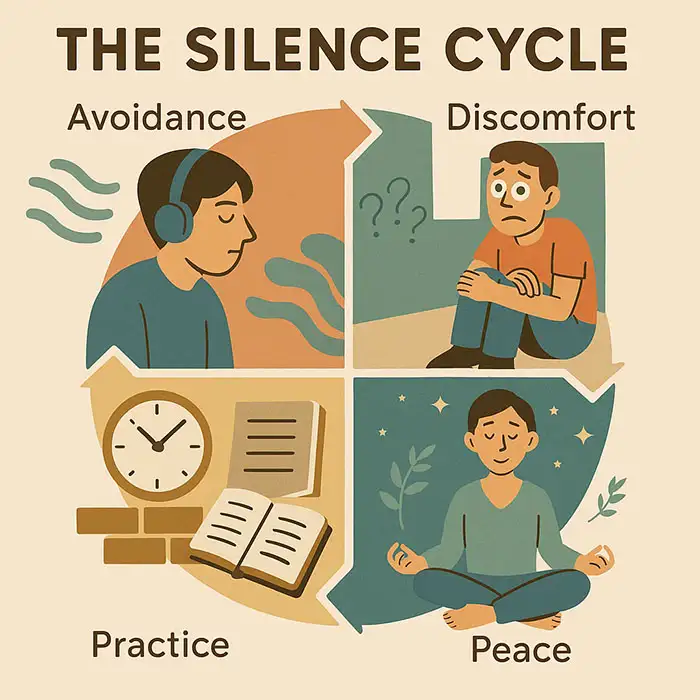
🟨 Infographic: 4-stage cycle of change (Avoidance → Discomfort → Practice → Peace).
Practical Tools and Exercises to Embrace Quiet
Grounding Techniques for Safe Silence

Grounding’s your anchor when quiet feels shaky. Try this: feet flat on floor, name five things you feel fabric on skin, air temp. It pulls you from head spin to body present. Or hold a cold glass, focus on chill spreading. I use it in waiting rooms no phone, just ground. Safe silence builds from there, turning unease into okay. For HSP types, add nature quiet park bench with bird sounds easing in. Bonus: breath count, in four, hold four, out four calms amygdala firing. From psych view, grounding rewires vagus nerve, shifting to parasympathetic rest. And if you’re queer navigating noisy social expectations, grounding in quiet can reclaim personal space without external validation noise.
The 3-3-3 Rule for Anxiety in Quiet Moments
Love this rule super simple. Name three things you see, three you hear, three body parts you move. Boom, back to now. In quiet anxiety spikes? It cuts the loop. I tried it during a solo hike quiet woods freaking me out, but naming leaves, wind rustle, wiggling toes? Grounded fast. Why works? Distracts from rumination, engages senses. Neuro: activates sensory cortex, quiets default mode network (that worry zone). Quick, no tools needed perfect for on-go.
How to Break Uncomfortable Silence Gently
Breaking it gentle means easing out, not slamming noise back. Start with soft sound humming tune or deep sigh. Or shift position, stretch slow. Don’t grab phone first; let quiet linger a sec. My trick: after quiet sit, I whisper “okay, that was fine” to affirm. Gently builds positive link. For folks with past trauma, gentle breaks prevent re-trigger therapist might suggest paired with EMDR. But watch: jumping to loud stuff reinforces avoidance, so ease slow. Evolutionarily, gentle transitions mimic natural quiet breaks, like dawn birds after night silence.
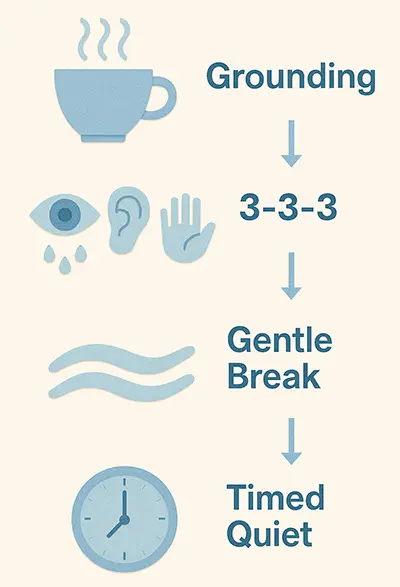
Real-Life Scenarios and Case Studies
My Journey: Retraining After Years of Podcasts and TV
Years of non-stop podcasts and TV? My quiet tolerance was zero. Started retraining post-burnout doc said cut noise. First tries? Miserable, mind racing on regrets. But weekly: 10-min quiet walks, no earbuds. By week four, enjoyed bird chirps. Now? Quiet’s my reset. Lesson: consistency wins, even if starts sucky. Linked to our mental self-care guide it helped big. From hormone view: reduced adrenaline spikes, more balanced cortisol.
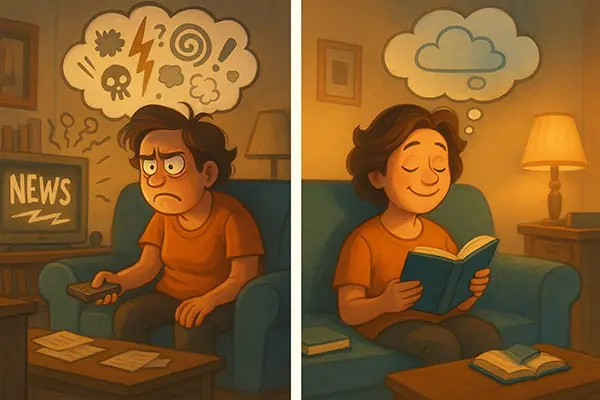
Stories from Others: Overcoming Silence Irritation
Heard from a reader, Sarah: Office worker, hated lunch alone always scrolled. Tried our tips, started with grounded breaths. Now? Enjoys quiet lunches, ideas flow better. Another, Alex (non-binary): Silence brought up family rejection vibes, but journaling in quiet helped process. Overcame by pairing with affirming podcasts first, then fading to pure quiet. Common thread? Small wins build big change. Psych studies show shared stories reduce isolation group therapy for silence aversion works wonders. For more tales, peep Psychology Today’s silence stories. 😊
Checklist for Building Silence Tolerance
Okay, so prevention’s key here you don’t wanna let that silence unease snowball into something bigger. Think of it like brushing your teeth; skip it, and cavities creep in. Start by spotting your noise crutches, those little habits that keep quiet at bay. Track progress weekly maybe a simple note in your phone: “How long did I sit quiet today without fidgeting?”

Prevention and Progress Tracking
I did this after a rough patch, and seeing those minutes add up felt like a win. From a psych view, tracking builds self-efficacy, that “I got this” vibe. And hey, if you’re in the LGBT+ community, where social noise might mask identity stuff, tracking can help unpack if quiet brings up extra layers like past rejection fears gentle journaling alongside helps. Just remember, progress ain’t linear; somedays you’ll backslide, and that’s okay. One neuro bit: consistent tracking lowers cortisol over time, making quiet less “threatening” to your brain.
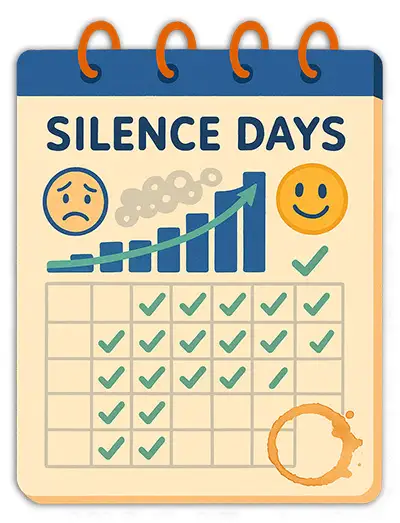
Daily Habits to Avoid Worsening Anxiety (With Tips on Worst Habits)
Worst habits? Doomscrolling before bed tops the list it’s like feeding your brain caffeine when it needs chamomile. Or always having TV on “for company,” which trains you to fear the off switch. Tip: swap it with a no-screen hour post-dinner, maybe read a book instead. I caught myself blasting music during chores; cutting back made quiet less jarring. Avoid multitasking too noise piles on when you’re juggling podcasts and emails. From hormone angle, these spike adrenaline, keeping your system revved. Break ’em by setting phone timers for quiet breaks, start at five mins. Oh, and caffeine late? Worsens racing thoughts in quiet switch to herbal tea. Simple swaps build tolerance without overwhelm.
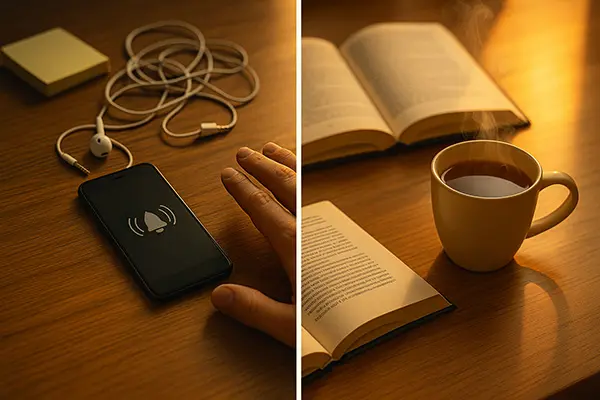
🟨 Checklist Table: Columns for “Habit,” “Why It Helps,” and “Track Your Progress” (include note on linking to overthinking post for more on anxiety habits).
| Habit | Why It Helps | Track Your Progress |
|---|---|---|
| 5-min daily quiet sit | Builds brain’s chill mode, reduces fight-or-flight | Log minutes weekly, note fidget levels |
| No-screen wind-down hour | Lowers dopamine crashes from overstimm | Check off nights done, rate sleep after |
| Grounding breath before quiet | Anchors body, cuts mind race | Count sessions, track heart rate drop |
| Journal post-quiet thoughts | Processes bubbled-up stuff, prevents buildup | Write entries, review for patterns monthly |
Note: For more on busting anxiety habits like overthinking, check our post at https://pathserenity.com/why-cant-i-turn-my-brain-off. 😌
Warning Signs and When to Seek Professional Help
Red Flags: When Silence Triggers Severe Anxiety
Red flags? When quiet doesn’t just bug you it hits like a panic wave. Heart pounding hard, sweaty palms, or that tight chest feeling like you can’t breathe. I had a friend who’d get flashbacky in silence, old traumas popping up uninvited. If it escalates to avoiding alone time altogether, or quiet spots make you dizzy, that’s a sign. Watch for sleep loss from fearing bedtime quiet, or irritability spiking post-silence. Psychologically, this could link to PTSD where quiet equals unsafe brain’s alarm blaring. And evolutionarily? Quiet signaled danger back in the day, but if it’s crippling now, pro help’s needed. Don’t ignore if it messes with work or relationships; that’s when discomfort turns disorder.

Knowing When It’s More Than Just Discomfort
It’s more than discomfort when quiet starts dictating your life like skipping walks ’cause no earbuds, or filling every gap with chatter. If self-tools flop after weeks, or unease bleeds into noisy times too, time for a therapist. I hit that point once; quiet unease turned general jitteriness, turns out underlying anxiety. Seek help if symptoms mimic depression, like low energy post-quiet. From neuro lens: if amygdala’s overactive from chronic noise, therapy like CBT rewires it. Hormones? High cortisol baselines mean quiet drops feel crashy docs can check. Therapy’s not weakness; it’s smart self-care, especially if trauma’s lurking. For folks navigating gender or sexuality stuff, a queer-affirming therapist can address how silence amplifies those unique stresses without judgment.
Research, Studies, and Stats on Silence and Mental Health
What Science Says About Noise Addiction
Science on noise addiction? It’s real think of it as your brain hooked on constant buzz, like a caffeine habit but for sounds. A study showed noise stress amps up amygdala activity, leading to anxiety and even addiction-like behaviors in the limbic system. Folks exposed to chronic noise report higher blood pressure and heart risks, per APA reports. I recall reading how urban noise pollution jacks depression rates by 25% for road-near dwellers. Psychologically, it’s avoidance noise drowns inner turmoil, but silence forces face-time with it. One review linked high noise annoyance to 55% more anxiety risk. Kinda funny how we’re “addicted” to what hurts us, right? For deeper, check Healthline’s silence benefits.
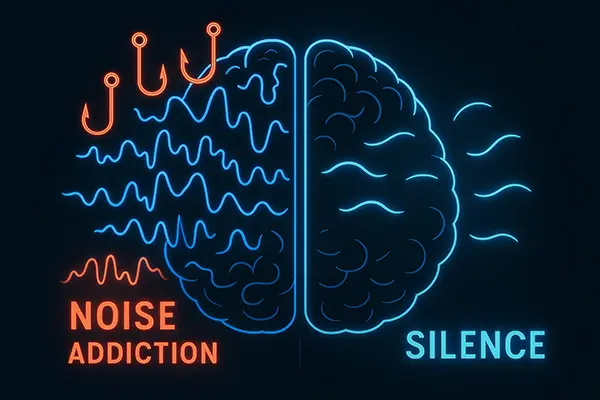
Studies on Nervous System Rewiring Through Quiet Practices
Quiet practices rewire your nervous system meditation and silence literally grow new brain cells. A 2013 study found two hours daily silence boosts hippocampus growth, key for memory and stress reg. Recent one: three days sustained quiet showed measurable new cells in that area. Mindfulness changes brain structure, reducing anxiety via MBSR programs. I tried silent retreats; felt my edginess fade, science backs it quiet shifts from beta survival waves to alpha/theta regen modes. Another: silence reduces mind-wandering by 27% in sessions. Neuro-wise, it thickens prefrontal cortex for better control, lowers inflammation tied to Alzheimer’s. Pretty wild how doing “nothing” rebuilds your wiring.
Stat Box: Key stats (e.g., “80% of people feel anxious in silence per recent survey”) with sources cited visually.
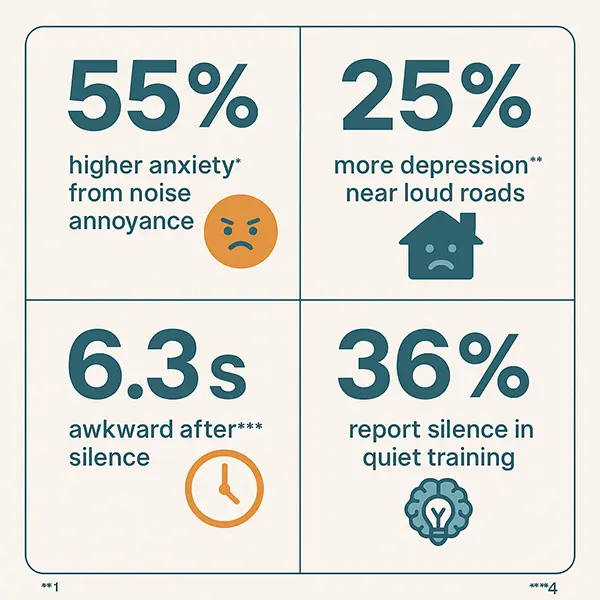
Frequently Asked Questions (FAQ)
Racing thoughts in quiet? Sucks when it kills your sleep or tanks focus during the day. Overstimulation’s often the villain digital buzz rewires your brain to crave input, making silence feel like withdrawal. Start small: try two-min quiet sits daily, build up. From Psychology Today’s silence guide. And if it’s ADHD-flavored, quiet amps inner chaos adapt with fidget tools. For LGBT+ folks, silence might stir identity worries; affirming practices help target that.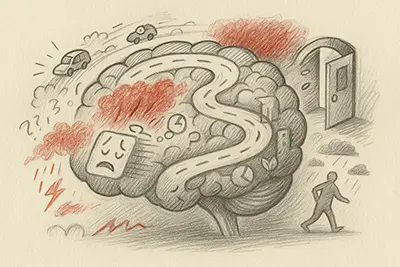
Quiet irritating, pushing you to endless distractions? Grounding tools save the day try holding a warm mug, focus on the heat. Or walk barefoot, feel grass. Makes silence safer without overwhelm. Link to our emotional boundaries post for more on safe spaces.
Can’t stand quiet, feeling flawed? Often links to ADHD brains crave stim to focus. Not a flaw, just wiring. Adapt exercises: pair quiet with low-key movement like pacing. Understand neurodivergence via Verywell Mind’s ADHD info. Target: customized quiet builds tolerance without shame.
Unease in quiet spaces, hiding deeper stuff like unresolved stress? Silent anxiety builds from chronic noise, masking issues ’til quiet exposes ’em. Recognize early: note when it spikes. Target digital wellness cut screens, embrace quiet. See our digital wellness category.
Anxiety spiking in silence, ruining rest? 3-3-3 rule’s a lifesaver: three sights, sounds, moves. Instant calm by engaging senses. Agitates when rest feels impossible, but apply it for quick wins. From mindfulness studies.
Bad habits amp unease, trapping you in noise cycles? Like constant earbuds or late caffeine. Agitates by worsening the loop. Target: swap with screen reductions, like no-phone meals. Break ’em for freedom link to mental self-care guide.
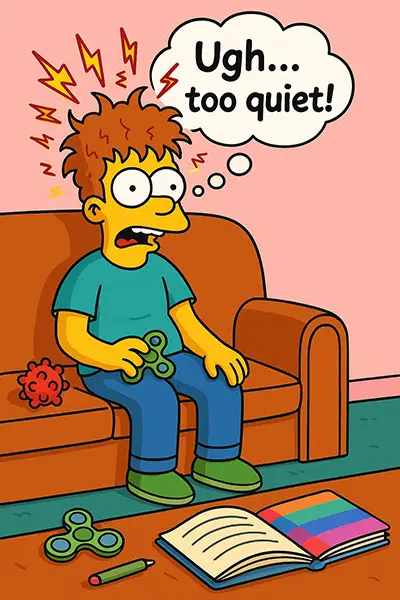
Problem: Racing thoughts in quiet; Agitate: It disrupts sleep and focus; Target: Learn why overstimulation is the culprit and start small practices.
Problem: Quiet feels irritating; Agitate: Leads to constant distraction; Target: Use grounding tools to make silence feel safe.
Problem: Can’t stand quiet; Agitate: Feels like a personal flaw; Target: Understand neurodivergence and adapt exercises.
Problem: Unease in quiet spaces; Agitate: Hides deeper issues; Target: Recognize it early for better digital wellness.
Problem: Anxiety spikes in silence; Agitate: Makes rest impossible; Target: Apply this quick rule for instant calm.
Problem: Bad habits amplify unease; Agitate: Traps you in noise cycle; Target: Break them with simple swaps, like reducing screen time.
Resources and Trusted Links
Books, Apps, and Studies for Deeper Dive
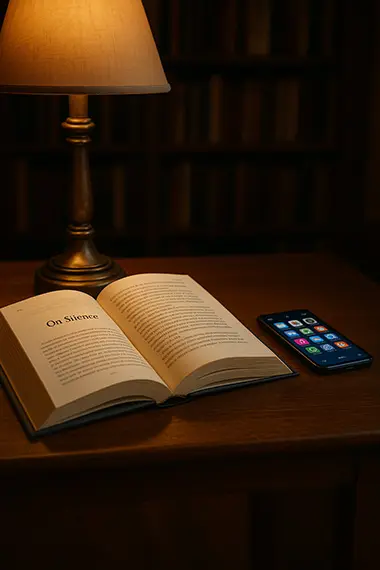
Dive deeper? Books like “The Power of Silence” by Graham Turner eye-opener on quiet’s magic. Apps: Calm or Insight Timer for guided silences. Studies: check PMC’s mindfulness neuro changes. Or Duke’s 2013 silence cell growth one. Solid for rewiring insights.
Related Articles on PathSerenity (e.g., Digital Overstimulation Guides)
On PathSerenity? Our why your emotions feel too much ties into emotional quiet. Or knowing yourself guide for self-awareness in silence. Digital guides like mental self-care help bust overstimulation.
If this sparked something, try a quick quiet sit today your brain’ll thank ya. For more paths to serenity, explore our emotional healing posts. 😊
Digital Overstimulation: How Constant Input Overwhelms Your Mind
Tired But Wired: When Your Body’s Exhausted But Your Brain Won’t Shut Up
✨ Last updated on 23.08.2025
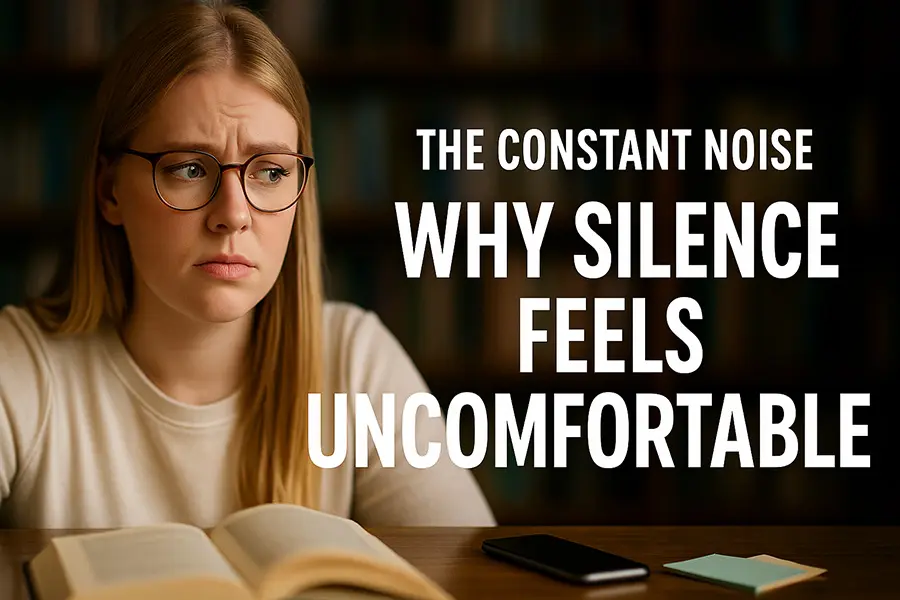










Leave a Reply